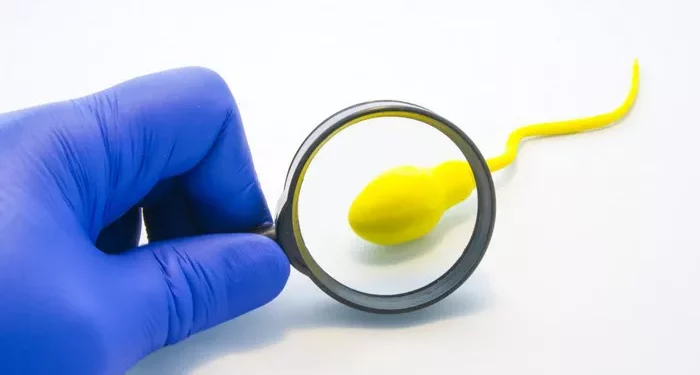Azoospermia is a medical condition characterized by the complete absence of measurable sperm in a person’s ejaculate. It affects approximately 1% of all individuals assigned male at birth and is a significant cause of male infertility. This condition can be challenging for those affected, as it often comes with emotional and psychological impacts due to its association with infertility.
Types of Azoospermia
Azoospermia is categorized into three main types, each with distinct causes and treatment approaches:
Post-Testicular Azoospermia
This type of azoospermia occurs due to issues after sperm production in the testes. It often involves blockages in the reproductive tract that prevent sperm from being ejaculated. Common causes include vasectomy, congenital absence of the vas deferens, or obstructions in the epididymis or ejaculatory ducts.
Testicular Azoospermia
In testicular azoospermia, the problem lies within the testes themselves. The testes may be unable to produce sperm adequately due to factors such as genetic abnormalities, testicular damage from trauma or infection, or exposure to harmful substances. This type often presents a more challenging scenario for treatment as it involves the fundamental process of sperm production.
Pre-Testicular Azoospermia
Pre-testicular azoospermia is caused by issues before sperm production in the testes. These issues are often related to hormonal imbalances that affect the stimulation of the testes to produce sperm. Conditions such as hypogonadotropic hypogonadism or endocrine disorders can lead to this type of azoospermia.
Understanding the specific type of azoospermia is crucial for determining the appropriate treatment strategy.
Causes
The causes of azoospermia can be varied and complex, often involving multiple factors. Key causes include:
Blockages in the Reproductive Tract
Obstructions can occur at various points in the reproductive system, preventing the passage of sperm. These blockages can be congenital (present from birth) or acquired due to infections, surgeries, or trauma.
Hormonal Imbalances
Hormones play a critical role in regulating sperm production. Imbalances in hormones such as testosterone, follicle-stimulating hormone (FSH), and luteinizing hormone (LH) can disrupt this process and lead to azoospermia.
Genetic Factors
Genetic abnormalities, such as Klinefelter syndrome or Y chromosome microdeletions, can impair testicular function and sperm production. Genetic testing is often necessary to identify these conditions.
Testicular Structure or Function Issues
Problems with the structure or function of the testes, such as varicoceles (enlarged veins in the scrotum), undescended testes, or testicular torsion, can affect sperm production and lead to azoospermia.
Symptoms
Azoospermia often presents with no noticeable symptoms other than infertility. However, the underlying causes may lead to other symptoms, including:
1. Low libido or sexual dysfunction
2. Testicular pain or swelling
3. Presence of lumps in the testes
4. Signs of hormonal imbalances, such as decreased body hair or muscle mass
Recognizing these symptoms can help in early detection and diagnosis of azoospermia.
Diagnosis
Proper diagnosis of azoospermia is essential to determine the type and underlying causes, guiding appropriate treatment. The diagnostic process may involve:
Physical Examination
A thorough physical examination by a healthcare professional can identify signs of hormonal imbalances, testicular abnormalities, or blockages.
Semen Analysis
A detailed analysis of the semen sample confirms the absence of sperm and provides information on semen volume, pH, and other parameters.
Hormone Testing
Blood tests to measure hormone levels (testosterone, FSH, LH) can help identify hormonal causes of azoospermia.
Genetic Counseling and Testing
Genetic testing can detect chromosomal abnormalities or specific genetic mutations that may be responsible for azoospermia.
Imaging Studies
Ultrasound or MRI scans of the reproductive organs can identify structural issues or blockages that may be causing azoospermia.
Accurate diagnosis is crucial for developing an effective treatment plan tailored to the individual’s specific condition.
Medical Treatments
Medical treatments for azoospermia vary depending on the type and underlying causes. Key treatment options include:
Surgical Interventions
For post-testicular azoospermia caused by blockages, surgical procedures can often restore the flow of sperm. Vasovasostomy or vasoepididymostomy are surgeries to reconnect or bypass blocked vas deferens or epididymis. In cases of ejaculatory duct obstruction, transurethral resection of the ejaculatory ducts (TURED) may be performed.
Hormone Therapy
Hormone therapy can be effective for pre-testicular azoospermia due to hormonal imbalances. Administering hormones such as human chorionic gonadotropin (hCG) or gonadotropin-releasing hormone (GnRH) can stimulate the testes to produce sperm.
Assisted Reproductive Techniques (ART)
For testicular azoospermia or cases where surgical correction is not possible, assisted reproductive techniques like in vitro fertilization (IVF) combined with intracytoplasmic sperm injection (ICSI) can be used. Sperm retrieval techniques, such as testicular sperm extraction (TESE) or microdissection TESE, may be employed to obtain sperm directly from the testes.
Lifestyle Changes
While medical treatments are essential, certain lifestyle changes can improve overall reproductive health and potentially support the treatment of azoospermia. These changes include:
Nutritious Diet
A balanced diet rich in vitamins, minerals, antioxidants, and healthy fats can enhance sperm production and overall reproductive health. Foods such as fruits, vegetables, whole grains, lean proteins, and nuts are beneficial.
Regular Exercise
Engaging in regular physical activity helps maintain a healthy weight, improve blood circulation, and reduce stress, all of which can positively impact reproductive health.
Avoiding Toxins
Minimizing exposure to environmental toxins, such as pesticides, heavy metals, and endocrine-disrupting chemicals, is crucial. Avoiding smoking, excessive alcohol consumption, and recreational drugs is also important.
Managing Stress
Chronic stress can negatively affect hormone levels and sperm production. Practicing stress-reducing techniques such as yoga, meditation, or mindfulness can be beneficial.
Maintaining a Healthy Weight
Obesity can lead to hormonal imbalances that affect sperm production. Maintaining a healthy weight through diet and exercise can improve reproductive health.
Home Remedies
While lifestyle changes can support overall health, it is essential to caution against relying solely on home remedies for treating azoospermia. Home remedies should not replace professional medical advice and treatment. Consulting with a healthcare professional is crucial for developing a personalized and effective treatment plan.
Herbal Supplements
Some herbal supplements, such as ashwagandha, maca root, and ginseng, are believed to improve male fertility. However, their efficacy is not well-established, and they should be used with caution and under medical supervision.
Antioxidant Supplements
Supplements like vitamin C, vitamin E, and coenzyme Q10 may improve sperm quality by reducing oxidative stress. Again, these should be taken under the guidance of a healthcare provider.
Prognosis and Management
The prognosis for azoospermia varies depending on the type and underlying causes. With appropriate medical intervention and lifestyle adjustments, many individuals can achieve successful treatment outcomes.
Post-Testicular Azoospermia
For cases involving blockages, surgical correction can often restore fertility. Assisted reproductive techniques can also offer a good prognosis for those where surgery is not possible.
Testicular Azoospermia
The prognosis is more variable for testicular azoospermia. While some individuals may respond to hormone therapy or surgical sperm retrieval, others may have limited options. In such cases, ART using donor sperm may be considered.
Pre-Testicular Azoospermia
Hormone therapy can effectively treat pre-testicular azoospermia due to hormonal imbalances, with a good prognosis for restoring sperm production.
Ongoing management and lifestyle adjustments can play a significant role in supporting treatment outcomes and maintaining reproductive health.
Support and Resources
Dealing with azoospermia and infertility can be emotionally challenging. Accessing support and resources is crucial for individuals and couples navigating this journey.
Emotional Support
Joining support groups, either in-person or online, can provide a sense of community and understanding. Counseling or therapy with a mental health professional experienced in infertility issues can also offer valuable emotional support.
Educational Resources
Numerous organizations and websites provide comprehensive information on azoospermia and infertility. Reliable resources include the American Society for Reproductive Medicine (ASRM), Resolve: The National Infertility Association, and the Mayo Clinic.
Professional Guidance
Consulting with a reproductive endocrinologist or urologist specializing in male infertility can provide personalized treatment plans and the latest information on available treatments and research.
Conclusion
In conclusion, while treating azoospermia at home involves making positive lifestyle changes, it is essential to seek professional medical advice and treatment. Proper diagnosis, medical intervention, and ongoing management are crucial for addressing the underlying causes and improving the chances of successful fertility outcomes. Emotional support and educational resources can also play a vital role in helping individuals and couples navigate the challenges of azoospermia and infertility.
Related Topics:
An Overview of Azoospermia: Causes, Diagnosis, and Treatments



























